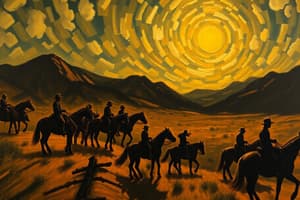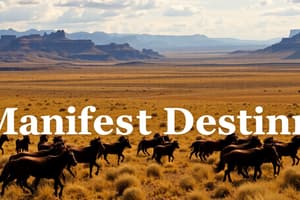Podcast
Questions and Answers
What was the main justification used to support the Westward Expansion in the United States?
What was the main justification used to support the Westward Expansion in the United States?
- The desire to explore new lands and establish trade routes
- The need to create economic opportunities for immigrants
- The philosophy of Manifest Destiny (correct)
- The abundance of natural resources in the East
Which event greatly contributed to the wealth and resources of the Western United States during the Westward Expansion?
Which event greatly contributed to the wealth and resources of the Western United States during the Westward Expansion?
- The Oregon Trail migration
- The Louisiana Purchase
- The Battle of the Alamo
- The California Gold Rush (correct)
What was the primary role of Chinese immigrants in the construction of the Transcontinental Railroad?
What was the primary role of Chinese immigrants in the construction of the Transcontinental Railroad?
- Providing financial support for the project
- Negotiating land deals with Native American tribes
- Working as the majority of the labor force (correct)
- Supervising the railroad operations
Which group faced discrimination, exclusionary laws, and prejudice despite their significant contributions during the Westward Expansion?
Which group faced discrimination, exclusionary laws, and prejudice despite their significant contributions during the Westward Expansion?
How did the Westward Expansion impact the social landscape of the United States?
How did the Westward Expansion impact the social landscape of the United States?
Flashcards are hidden until you start studying
Study Notes
Westward Expansion: Shaping America's Growth and Diversity
During the 19th century, a powerful force propelled the United States westward, transforming the nation's geographic, economic, and social landscape. This drive, known as Manifest Destiny, would pave the way for significant events such as the California Gold Rush, the construction of the Transcontinental Railroad, and the influx of Chinese immigrants.
Manifest Destiny
Manifest Destiny, a term coined in 1845, was a belief that the United States was destined to expand its territories from the Atlantic to the Pacific Ocean, with a mission to spread democracy, Christianity, and American values. This philosophy fueled a sense of entitlement and a belief in America's exceptionalism, which often clashed with the sovereignty of indigenous peoples and the Spanish and Mexican territories.
California Gold Rush
In 1848, James W. Marshall discovered gold at Sutter's Mill in California, sparking the California Gold Rush. This event drew thousands of prospectors from across the United States and abroad, creating a diverse population and a burgeoning economy. Although the gold rush was short-lived, the discovery of gold brought significant wealth and resources to California, allowing the state to join the Union in 1850.
Transcontinental Railroad
The Transcontinental Railroad, completed in 1869, connected the eastern and western halves of the United States. Building the railroad, which stretched from Council Bluffs, Iowa, to Sacramento, California, required the labor of thousands of workers, including Chinese immigrants. The railroad significantly shortened the journey between coasts and opened up new economic opportunities, facilitating westward expansion and faster communication and trade between the two halves of the nation.
Chinese Immigrants
Chinese immigrants played a vital role in the construction of the Transcontinental Railroad, supplying the majority of the labor force. Despite their significant contributions, Chinese Americans faced discrimination, exclusionary laws, and widespread prejudice. Chinese immigrants, who arrived in the United States primarily during the mid-19th century, sustained growth in the West through their work in agriculture, mining, and other industries.
Legacy and Consequences
The Westward Expansion left a lasting impact on the United States, shaping its geographic, economic, and social landscape. The Manifest Destiny philosophy provided a powerful justification for the nation's westward expansion, while the events of the California Gold Rush and the Transcontinental Railroad brought significant wealth and resources to the West and facilitated westward expansion.
However, the Westward Expansion also led to the displacement of Native American tribes and the marginalization of Chinese immigrants. The influx of new populations and the expansion of the nation's territories highlighted the need to address the complexities of race, ethnicity, and national identity. The legacy of the Westward Expansion continues to shape American history, politics, and culture.
In conclusion, the Westward Expansion was a pivotal period in American history, driven by Manifest Destiny and marked by the California Gold Rush, the construction of the Transcontinental Railroad, and the influx of Chinese immigrants. The events of this era transformed the United States, shaping its geographic, economic, and social landscape and leaving a lasting impact on American history.
Studying That Suits You
Use AI to generate personalized quizzes and flashcards to suit your learning preferences.




